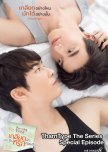Cette critique peut contenir des spoilers
A glimpse of what 'TharnType: The Series' could have been
My viewing experience of 'TharnType: The Series' (TTTS) very quickly devolved into hate-watching. I will admit, however, that, layered with that hate was a certain fascination with the interactions between Mew Suppasit and Gulf Kanawut. When, in their respective roles as Tharn and Type, they aren't physically or psychologically violating one another—which, sadly, they do throughout TTTS—there is an undeniable chemistry between them, generating both sweetness and heat. This led me to complete TTTS and watch "Our Final Love" (OFL).
OFL would collapse without the lead actors' chemistry, as this chemistry is the one thing that helps to hold the episode's disparate parts together. The first third of the episode only exists to indicate that Tharn and Type are entering the fourth year of their relationship, and could have been discarded without consequence. Some of the final moments of OFL are, unforgivably, spent rehabilitating Lhong, who, in TTSS, gets away unscathed despite plotting a gang rape, perpetrating blackmail, engaging in relationship sabotage, and attempting a murder. That he is badly tortured by his conscience is supposed to be enough to redeem him here.
The section that manages to make the most narrative sense, but just barely, is the middle one: a flashback to the time when Tharn accompanies Type home to be introduced to Type's parents, some months after the events of TTTS. This set-up is a romantic-comedy staple, and it plays out in a more or less entertaining, if also largely conventional, way. In the course of dealing with opposition to their relationship from Type's father, Tharn and Type bicker, trade innuendos, cuddle, make out, have sex, and affirm their undying devotion to each other. The story then jumps forward to the present to reveal Tharn and Type waking up from their dream of the meet-the-parents scenario. For some reason, Tharn takes this as an opportunity to cajole Type to don a pair of cat ears and meow for him—bizarre, but charming enough that I can let it slide.
OFL tries to get out from under the decidedly queerphobic, abuse-glorifying shadow of TTTS, by having Type's mother validate her son's romance and Type reconcile with his gay friend Kom, but these come across as feel-good concessions in the name of grudging tolerance rather than wholehearted acceptance. Still, the middle section as a whole does at least hint at how much better TTTS could have been, trimmed of MAME's obnoxious, dangerous attempts to be provocative for its own sake.
OFL would collapse without the lead actors' chemistry, as this chemistry is the one thing that helps to hold the episode's disparate parts together. The first third of the episode only exists to indicate that Tharn and Type are entering the fourth year of their relationship, and could have been discarded without consequence. Some of the final moments of OFL are, unforgivably, spent rehabilitating Lhong, who, in TTSS, gets away unscathed despite plotting a gang rape, perpetrating blackmail, engaging in relationship sabotage, and attempting a murder. That he is badly tortured by his conscience is supposed to be enough to redeem him here.
The section that manages to make the most narrative sense, but just barely, is the middle one: a flashback to the time when Tharn accompanies Type home to be introduced to Type's parents, some months after the events of TTTS. This set-up is a romantic-comedy staple, and it plays out in a more or less entertaining, if also largely conventional, way. In the course of dealing with opposition to their relationship from Type's father, Tharn and Type bicker, trade innuendos, cuddle, make out, have sex, and affirm their undying devotion to each other. The story then jumps forward to the present to reveal Tharn and Type waking up from their dream of the meet-the-parents scenario. For some reason, Tharn takes this as an opportunity to cajole Type to don a pair of cat ears and meow for him—bizarre, but charming enough that I can let it slide.
OFL tries to get out from under the decidedly queerphobic, abuse-glorifying shadow of TTTS, by having Type's mother validate her son's romance and Type reconcile with his gay friend Kom, but these come across as feel-good concessions in the name of grudging tolerance rather than wholehearted acceptance. Still, the middle section as a whole does at least hint at how much better TTTS could have been, trimmed of MAME's obnoxious, dangerous attempts to be provocative for its own sake.
Cet avis était-il utile?




